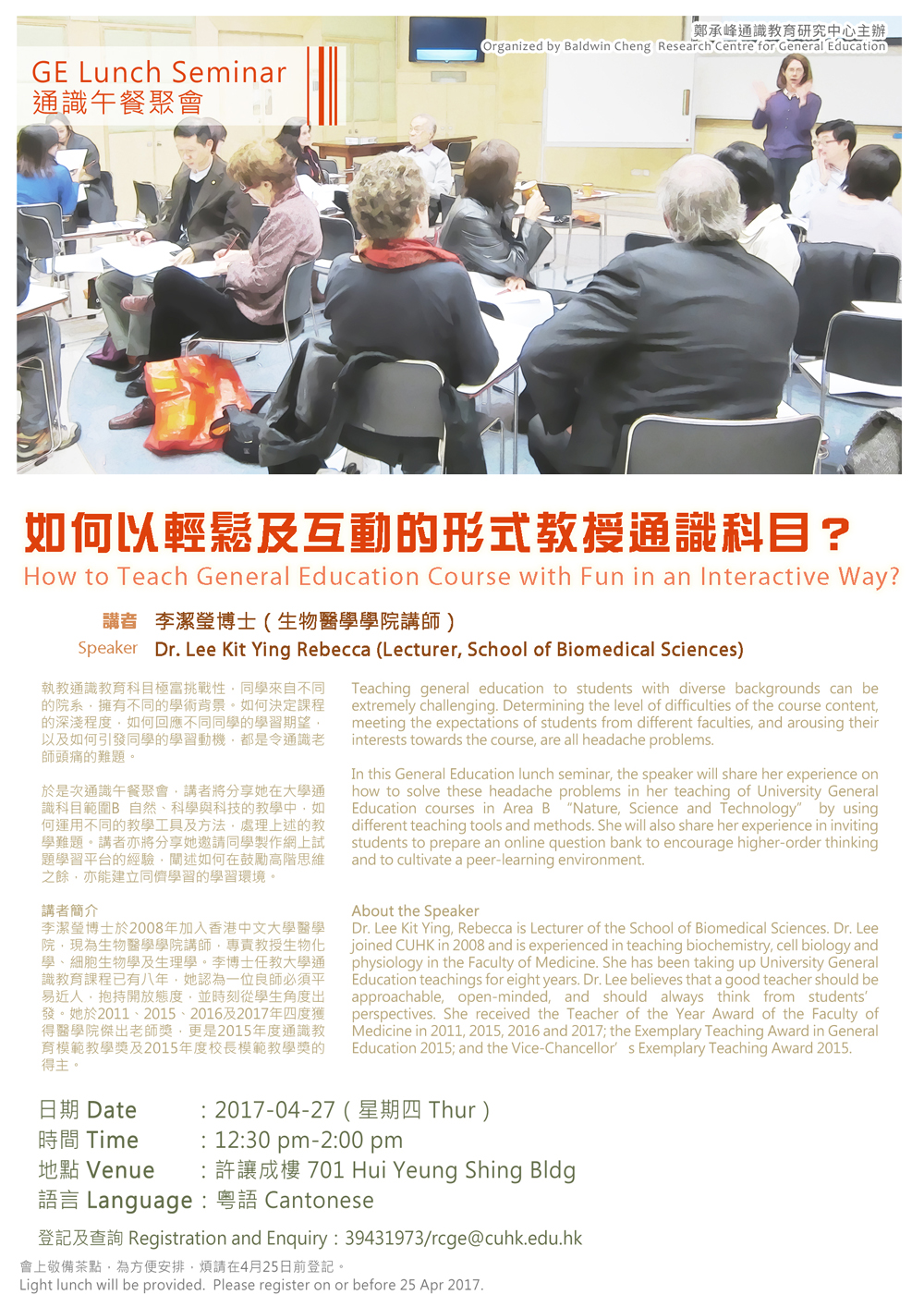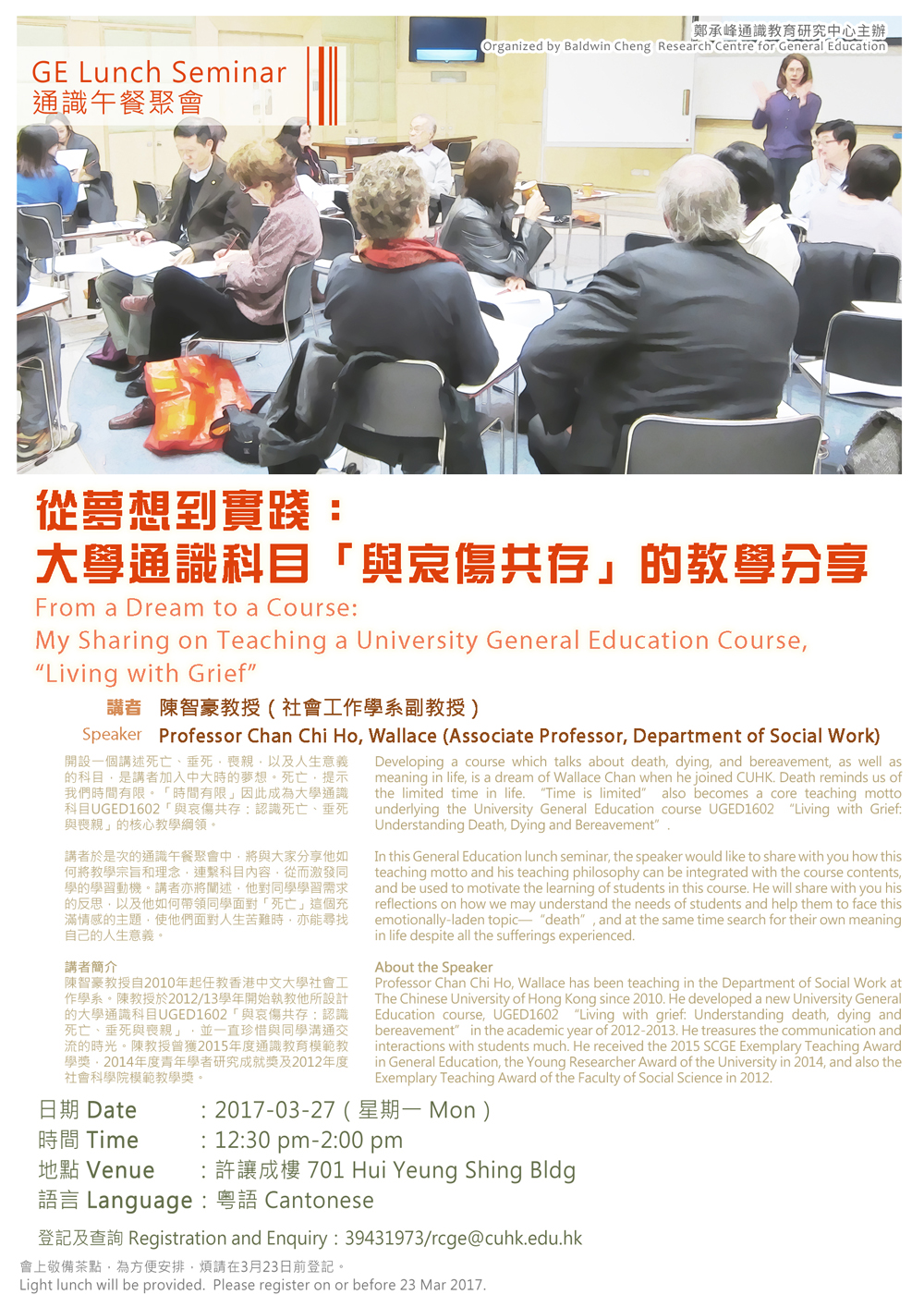How to Teach General Education Course with Fun in an Interactive Way?
How to Teach General Education Course with Fun in an Interactive Way?
Speaker: Dr. Lee Kit Ying Rebecca (Lecturer, School of Biomedical Sciences)
Date: 27 Apr 2017 (Thursday)
Language: Cantonese
Teaching general education to students with diverse backgrounds can be extremely challenging. Determining the level of difficulties of the course content, meeting the expectations of students from different faculties, and arousing their interests towards the course, are all headache problems.
In this General Education lunch seminar, the speaker will share her experience on how to solve these headache problems in her teaching of University General Education courses in Area B “Nature, Science and Technology” by using different teaching tools and methods. She will also share her experience in inviting students to prepare an online question bank to encourage higher-order thinking and to cultivate a peer-learning environment.
Speaker’s Bio
Dr. Lee Kit Ying, Rebecca is Lecturer of the School of Biomedical Sciences. Dr. Lee joined CUHK in 2008 and is experienced in teaching biochemistry, cell biology and physiology in the Faculty of Medicine. She has been taking up University General Education teachings for eight years. Dr. Lee believes that a good teacher should be approachable, open-minded, and should always think from students’ perspectives. She received the Teacher of the Year Award of the Faculty of Medicine in 2011, 2015, 2016 and 2017; the Exemplary Teaching Award in General Education 2015; and the Vice-Chancellor’s Exemplary Teaching Award 2015.
From a Dream to a Course
From a Dream to a Course:
My Sharing on Teaching a University General Education Course, “Living with Grief”
Speaker: Prof. Chan Chi Ho, Wallace (Associate Professor, Department of Social Work)
Date: 27 March 2017 (Monday)
Language: Cantonese
Developing a course which talks about death, dying, and bereavement, as well as meaning in life, is a dream of Wallace Chan when he joined CUHK. Death reminds us of the limited time in life. “Time is limited” also becomes a core teaching motto underlying the University General Education course UGED1602 “Living with Grief: Understanding Death, Dying and Bereavement”.
In this General Education lunch seminar, the speaker would like to share with you how this teaching motto and his teaching philosophy can be integrated with the course contents, and be used to motivate the learning of students in this course. He will share with you his reflections on how we may understand the needs of students and help them to face this emotionally-laden topic—“death”, and at the same time search for their own meaning in life despite all the sufferings experienced.
Speaker’s Bio
Professor Chan Chi Ho, Wallace has been teaching in the Department of Social Work at The Chinese University of Hong Kong since 2010. He developed a new University General Education course, UGED1602 “Living with grief: Understanding death, dying and bereavement” in the academic year of 2012-2013. He treasures the communication and interactions with students much. He received the 2015 SCGE Exemplary Teaching Award in General Education, the Young Researcher Award of the University in 2014, and also the Exemplary Teaching Award of the Faculty of Social Science in 2012.
Proposing or Revising a University General Education Course
Proposing or Revising a University General Education Course
Speaker: Dr. Wong Wing Hung (Associate Director, Office of University General Education)
Date: 14 December 2016 (Wednesday)
Language: English
Starting from 2004, all University General Education (UGE) courses have been categorized into 4 Areas: Area A Chinese Cultural Heritage, Area B Nature, Science and Technology, Area C Society and Culture, and Area D Self and Humanity. With the support from over 40 teaching units, 256 UGE courses are offered by the University of General Education. In the 2015/16 academic year, 312 classes of UGE courses were conducted, and more than 15,000 students enrolled.
This seminar targets at departments and teachers interested in proposing new UGE courses or in revising existing ones in 2017/18 academic year. We will 1) introduce the design of the UGE programme as a whole, 2) go through the procedures and criteria of UGE course approval, 3) introduce the GE Course Proposal and Inventory System (GECPI), which is a web system for the submission of UGE Course Proposals and the inventory of UGE course materials, and 4) briefly discuss the UGE course review and archive arrangements.
*For more information of submission of proposals for introduction and revision of UGE courses in 2017-18, please visit our website: http://www5.cuhk.edu.hk/oge/index.php/en/teaching-a-learning/2011-07-04-07-54-58/proposing-new-courses-ge-course-proposal-a-inventory
![]() Presentation powerpoint (login required)
Presentation powerpoint (login required)![]() Bloom's Taxonomy (login required)
Bloom's Taxonomy (login required)
Unfolding the Key Elements of Modern Sciences through General Education Courses on Astronomy and its History
Unfolding the Key Elements of Modern Sciences through General Education Courses on Astronomy and its History
Speaker: Dr. Tong Shiu Sing (Dept. of Physics)
Date: 21 November 2016 (Monday)
Language: Cantonese
Astronomy is the oldest of the sciences, dating back to antiquity. Originated from religious beliefs, philosophical and political demands, ancient astronomical activities have also indirectly become the foundation of sciences. The revolution in astronomy in the 16th century has indeed directly contributed to the birth of modern physics and completely changed the history of the humankind. Western astronomy has its heritage in ancient Greek and medieval Islamic cultures, with its own unique system of mathematical logic and empirical research methods, which is completely incompatible with ancient Chinese traditions. Questions like whether the scientific revolution in the West during the 16th-17th centuries arose from the Renaissance and external factors such as the change of social structure, or from internal factors such as culture and mathematical convention; and why there had not been a scientific revolution in China have always been the focus of debates among the historians of science history. Through teaching the history of astronomy in General Education, students can be guided to understand the key elements of modern sciences. In this GE lunch seminar, the speaker will outline the following:
- how to compare Chinese and Western scientific conventions and unfold the elements of modern sciences in University General Education courses, with illustrations from the history of astronomy;
- how to illustrate abstract astronomical or scientific concepts, and scientific methodologies to students, especially those not in the science disciplines, without involving too many technical details; and
- how to teach students to distinguish scientific and non-scientific elements in the history of astronomy, and explain the contributions of scientific methodologies towards human civilization.
Speaker’s Bio
Dr. Tong Shiu Sing is Senior Lecturer of the Department of Physics, and Associate Director of the Centre for Promoting Science Education. Dr. Tong has received the 2010 Physics Teaching Award, the Exemplary Teaching Award of the Faculty of Science in 2011 and 2015, and the 2015 Exemplary Teaching Award in General Education. Dr. Tong has been teaching UGEB2410 Astronomy for more than twenty years; and UGEB2510 The Stars and Our Lives, initiated and designed by himself, for more than 10 years. Dr. Tong is enthusiastic in promoting science and physics education in secondary schools: he has been involved in the curriculum design of the new senior secondary school physics subject, published several web-based teaching kits, illustrated the abstract concepts of physics to secondary students by making use of multimedia, novel computer software and enriched empirical methods. Dr. Tong is also the author of several physics and integrated sciences textbooks for secondary students., In recent years, Dr. Tong has dedicated himself in the promotion of physics and science education through appearance in television programmes, newspapers, magazines, social media; and speaking in seminars and adjudicating in science project competitions
Encouraging Cooperative Learning between and within Student Groups: Two Illustrative Cases
Co-organized by Office of University General Education and CLEAR
Encouraging Cooperative Learning between and within Student Groups: Two Illustrative Cases
Speaker: Dr. Ng Wai Yin Will (Centre for Learning Enhancement And Research)
Date: 25 October 2016 (Tuesday)
Language: English
Like it or not, students are paying less attention to the sage-on-the-stage and more towards peers-on-their-side. Of course it is students' improper inattention in the case of a proper lecture, but there are times, especially when student participation is called for, such as in discussion, laboratory and project works, when the teacher had better get off stage, in order to "facilitate". Facilitation is especially crucial now that more students tend to see class works as a matter of competition, in which case they may not behave comely towards each other.
In principle, such facilitation should aim for peer interaction that encourages cooperative learning, whether the learning activity being facilitated is competitive or cooperative in nature. In this GE lunch seminar, the speaker will present two concrete cases from his own teaching experience, one on group project and one on class discussion, for which he has developed means for such a purpose.
This is the last of a seminar series on strategic learning behaviour, and the first one to be given in English. For the benefit of those who may not manage the first two, given in Cantonese, the speaker will give a brief review of the whole series, and offer his own reflection on approaching this important issue as a matter of teaching and learning research.
Speaker’s Bio
Dr. Ng Wai Yin Will had taught at The Chinese University of Hong Kong for almost three decades. He was enthusiastic about diverse experience of teaching and research. During his year of teaching, the subjects he taught included engineering science, project management, general education, as well as guiding academic research and liberal studies topics. After resigning from teaching position, he started to focus on the basic of education, contemplating on how, what and why human learnt. He is now working on research projects related to teaching and learning in the Centre for Learning Enhancement and Research at CUHK. His focus is on learning ethos and students’ strategic learning behaviors in universities.
![]() Presentation Powerpoint (login required)
Presentation Powerpoint (login required)
University General Education Teachers’ Orientation
University General Education Teachers’ Orientation
Speaker: Dr. Wong Wing Hung (Associate Director of the Office of University General Education
Date: 26 September 2016 (Monday)
Language: English
The Office of University General Education will kick off its new series of GE lunch seminars with an orientation for new GE teachers. We seek your assistance in circulating this invitation to and nominating new GE teachers in your departments to attend this seminar. Besides learning more about the GE programme, its expectation and management, they will also have a chance to network with each other. Details of the orientation are as follows:
Themes
Dr. Wong Wing Hung, Associate Director of the Office of University General Education, will brief colleagues of the key features of the GE programme, its expectations for students, its management, as well as some findings from our recent research on GE students’ learning experience. It will be followed by a Q&A and general sharing session.
Who should join?
The orientation targets at
- New teachers who joined the UGE teaching team from 2015/2016 onwards.
- Teachers who would like to refresh their understanding of the features of the GE programme
![]() Presentation Powerpoint (login required)
Presentation Powerpoint (login required)










